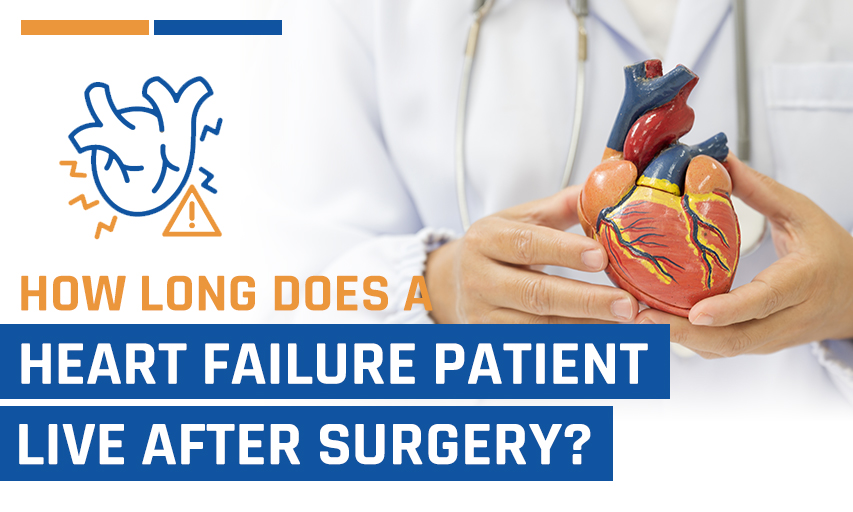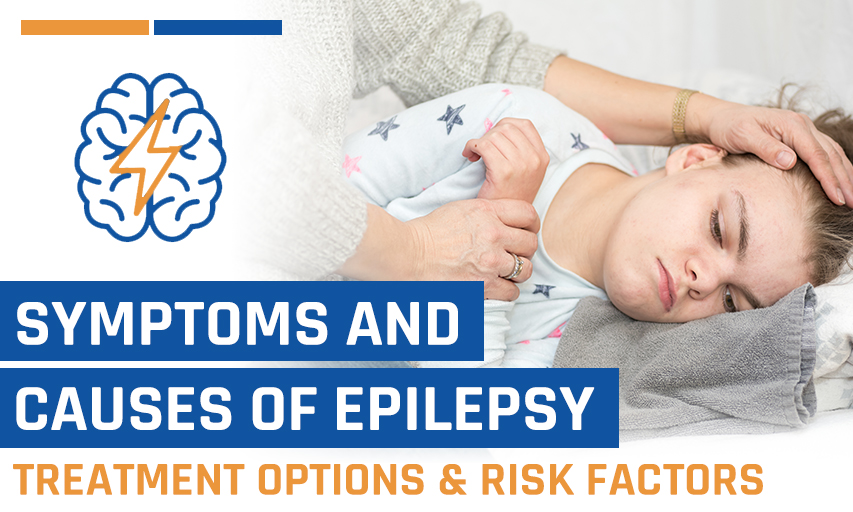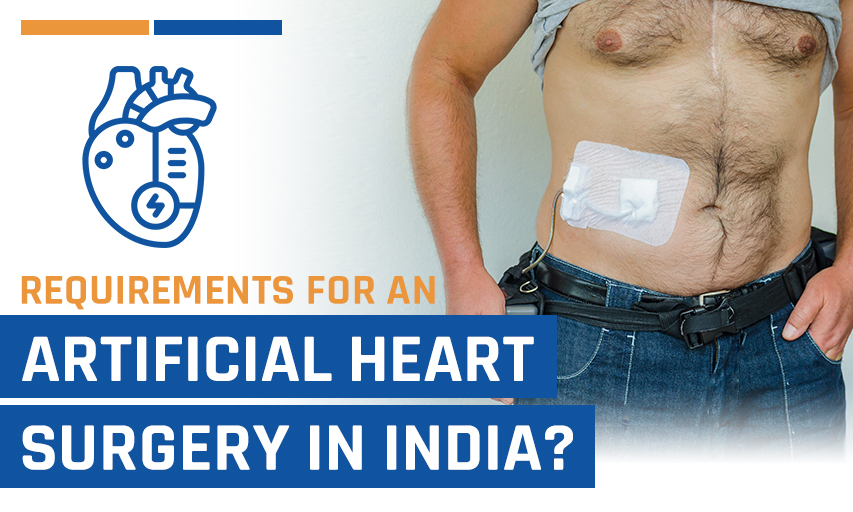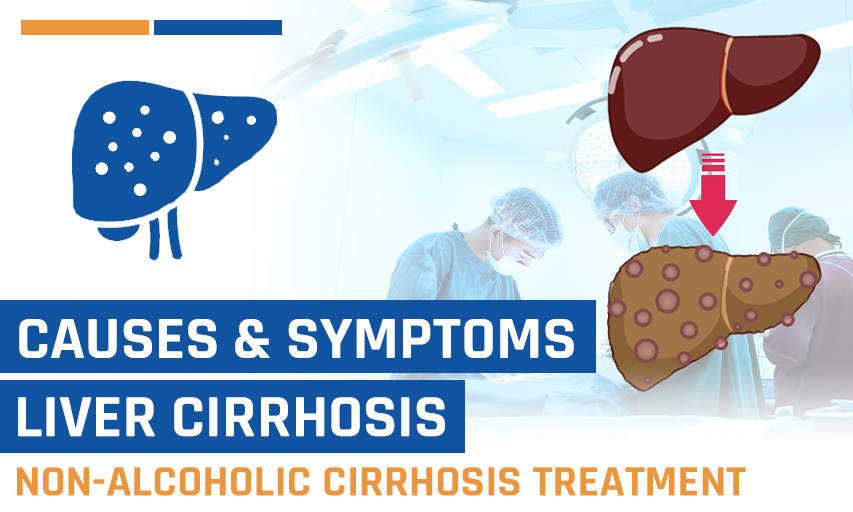How Long Does a Heart Failure Patient Live Before and After Surgery?
Being diagnosed with heart failure means your heart is no longer pumping enough blood and oxygen to meet your body’s needs. This reduced blood flow can impair the function of your vital organs and lead to symptoms of heart failure like shortness of breath, fatigue, and swelling. While heart failure is a chronic and progressive condition with no definitive cure, advancements in medical treatment and surgery can extend a patient’s lifespan and improve their quality of life.
To understand ‘How long does a heart failure patient live?’, it's important to consider the many factors that influence survival, both before and after surgery. This blog will inform you about everything regarding these factors and what patients and families can expect.
What are the Stages of Congestive Heart Failure?
In order to understand ‘How long does a heart failure patient live?’ you need to know about the heart failure stages, which determine the extent of the condition and influence the survival chances of a patient. Congestive heart failure can be classified in four stages depending on the severity of the symptoms and the intensity of heart function impairment. The heart failure stages are as follows:
■ Stage A:
Stage A is considered the pre-heart failure stage. While there are no symptoms of heart failure at this stage, patients are at high risk due to factors such as a family history of heart disease, high blood pressure, diabetes or prediabetes, metabolic syndrome, obesity, a history of alcohol abuse or smoking, and coronary artery diseases. Early lifestyle changes and medical management are useful in preventing progression to more advanced stages here.
■ Stage B:
At this stage, structural changes in the heart, such as left ventricular systolic dysfunction, are detected through imaging tests, but the patient still doesn’t show any symptoms of heart failure. This stage is when heart failure is first diagnosed at a clinical level, even though the patient may feel fine.
■ Stage C:
This stage is where symptoms of heart failure become apparent with signs such as shortness of breath, fatigue and weakness, swelling in the legs, ankles, or feet, difficulty urinating or frequent nighttime urination, and sudden weight gain from fluid retention. Stage C is where most patients begin receiving treatment to manage symptoms and improve heart function.
■ Stage D:
Stage D is considered the last and final stage of heart failure, where the debilitating symptoms start disrupting a patient’s quality of life, rendering the patient’s body unable to respond to treatments. Symptoms are persistent and often do not improve with standard treatments. Patients in this stage require advanced interventions such as mechanical circulatory support, heart transplant, continuous intravenous medications, and palliative care to maintain comfort and quality of life.
What are the Options for Congestive Heart Failure Treatment in India?
Congestive heart failure is a long-term condition that requires a comprehensive treatment plan for the best results. Although it cannot be completely cured, a combination of medical therapy, lifestyle changes, and surgical options can help manage the condition and increase its life expectancy. Here are the options for congestive heart failure treatment:
1. Lifestyle Changes:
Lifestyle changes are often the first line of defence in managing heart failure. Patients are advised to follow a low-sodium diet to reduce fluid buildup, maintain a healthy weight, and engage in regular physical activity in line with their condition. Quitting smoking, avoiding alcohol, and managing stress, along with monitoring daily fluid intake and checking weight regularly, can help detect fluid retention early and prevent hospitalisations.
2. Medications:
Several classes of medications can be prescribed to relieve symptoms, improve heart function, and slow the disease progression. ACE inhibitors or ARBs help relax blood vessels, lower blood pressure, and reduce the strain on the heart. Beta-blockers slow down the heart rate and help the heart beat more effectively. Diuretics, commonly known as water pills, help the body eliminate excess fluid. Aldosterone antagonists can enhance the effects of other medications and reduce the risk of hospital admissions. In some cases, digoxin is prescribed to strengthen heart contractions. More recently, SGLT2 inhibitors, which were originally developed for diabetes, have shown benefits for heart failure management. These medications should, however, not be taken without a doctor’s consultation.
3. Medical Devices:
When medications alone are not sufficient, implantable devices can help manage more advanced heart failure. An Implantable Cardioverter Defibrillator can prevent sudden cardiac death by correcting dangerous arrhythmias. Cardiac resynchronisation therapy devices coordinate the heart's contractions to improve its pumping efficiency. For patients with severe symptoms and poor heart function, a Left Ventricular Assist Device is used either as a long-term management device or as a bridge to heart transplantation.
4. Surgical Options:
In some cases, surgery becomes necessary to resolve structural problems in the heart. A coronary artery bypass grafting surgery can help restore blood flow in patients with blocked arteries. Heart valve repair or replacement is recommended when faulty valves are worsening heart failure symptoms. For patients with end-stage heart failure who do not respond to other treatments, a heart transplant becomes the only viable option for extending life.
5. Cardiac Rehabilitation:
Cardiac rehab is a medically supervised program that combines exercise training, education on heart-healthy living, and counselling to help patients cope with their condition. It is especially beneficial after surgery or a major cardiac event and helps to improve stamina, reduce symptoms, and support emotional well-being during recovery.
6. Palliative Care:
For patients with advanced heart failure who are not candidates for surgery or aggressive treatment, palliative care helps manage symptoms and provide comfort. This includes pain management, psychological support, and guidance for both patients and families on end-of-life decisions. The goal is to maintain the best possible quality of life, even in the face of a serious illness.
What are the Factors Influencing Life Expectancy of a Heart Failure Patient Before and After Surgery?
The answer to the question, ‘How long does a heart failure patient live?’ varies depending on several key factors that influence both disease progression and treatment outcomes. While medical advances have improved survival rates, early diagnosis and timely intervention can help achieve better results. Here are the factors influencing the life expectancy of a heart failure patient:
■ Age:
Younger patients have better recovery rates and respond to treatment more favourably. In contrast, older patients often face poorer results due to age-related decline in their health and reduced resilience. The body's capacity to withstand and recuperate from surgery declines with age.
■ Overall Health Status:
Patients who are healthy in general, especially their hearts, are more likely to recover well from heart failure and related surgeries. Obesity, frailty, or malnutrition are examples of pre-existing conditions that can make recovery harder and raise the risks during and after surgery.
■ Stage of Heart Failure:
The stage of heart failure can determine a patient’s life expectancy. Early-stage cases often respond better to lifestyle changes and medication, while advanced stages involve higher mortality risks and require more aggressive treatments, such as surgery or transplant.
■ Presence of Comorbidities:
If you have coexisting health conditions such as diabetes, kidney disease, or a chronic lung condition, it is more likely to reduce your life expectancy compared to patients without any comorbidities.
■ Type & Complexity of Surgery:
The kind of surgery, whether it's bypass surgery, valve replacement, or implantation of a device like an LVAD, can influence the procedural results. Complex or high-risk procedures naturally carry a greater chance of complications, particularly if performed in the later stages of heart failure.
■ Proper Post-op Care:
Post-surgical care is an important part of recovery after a heart failure patient is diagnosed. Hence, patients who strictly follow rehabilitation exercises and the doctor's instructions are more likely to recover faster.
What is the Life Expectancy of a Heart Failure Patient Before Surgery?
When a patient is diagnosed with heart failure, the answer to the question, ‘How long does a heart failure patient live before surgery?’ depends on factors such as the age, presence of other medical conditions, and the severity of the heart failure at the time of diagnosis.
For patients who are not yet in the advanced phase, the chances of survival and recovery are better, especially with early intervention and proper management. According to research, approximately 50% of patients diagnosed with congestive heart failure survive five years or more after their initial diagnosis, even before undergoing surgery.
It is also important to note that untreated or poorly managed heart failure can become life-threatening and even reduce survival time. Early diagnosis, consistent treatment, and lifestyle changes can improve life expectancy and delay the need for surgery.
What is the Life Expectancy of a Heart Failure Patient After Surgery?
It’s natural to wonder, ‘How long does a heart failure patient live after surgery?’ While no one can predict the exact outcomes, advancements in surgical techniques and individualised treatment plans have significantly improved the survival rates and quality of life for many heart failure patients.
Life expectancy after surgery depends on several factors, including the patient’s age, health, stage of heart failure at the time of surgery, and how well they adhere to post-operative care. With proper treatment and follow-up, many patients can live for up to 10-15 years or more following surgery, especially if the procedure is performed before the condition becomes severe.
According to some reports, the post-surgery survival rate for heart failure patients can reach approximately 48.5%, depending on the type of intervention and patient-specific variables. This means that nearly half of the patients go on to live for several years after treatment, particularly when supported by lifestyle changes and consistent medical care.
Early diagnosis, intervention, cardiac rehabilitation, medication adherence, and routine monitoring all play a major role in extending life expectancy after surgery.
Why Get Heart Failure Treatment in India?
India has rapidly emerged as a global hub for advanced cardiac care, offering top-quality treatment for heart failure at a fraction of the cost compared to many Western countries. Here are the reasons why thousands of international patients choose India for heart failure treatment:
■ Highly Qualified Cardiologists & Surgeons
India is home to some of the world’s leading cardiologists, heart failure specialists, heart surgeons, and cardiac care teams. The cardiac specialists with CureIndia have been trained or have worked internationally and bring extensive experience in treating complex heart failure cases.
■ State-of-the-Art Medical Facilities
The hospitals in India are equipped with advanced diagnostic tools, advanced surgical technologies, and well-established cardiac ICUs. These facilities adhere to international standards of care and patient safety.
■ Affordable Cost of Treatment
Heart failure treatment, including surgeries like valve replacements, CABG, or implantation of devices like ICDs and LVADs, is more affordable in India, often 60-80% less than in the US, UK, or Europe, without compromising on quality.
■ Shorter Waiting Times
Unlike in many countries where patients face long waiting lists for heart procedures, Indian hospitals offer quicker scheduling for diagnostics, consultations, and surgeries. This timely intervention can be life-saving for heart failure patients.
■ Comprehensive Post-Operative Care
Leading hospitals in India provide integrated postoperative care, including cardiac rehabilitation, physiotherapy, dietary counseling, and psychological support, all of which help speed recovery and manage heart failure.



















Be First To Comment
Leave a Comment